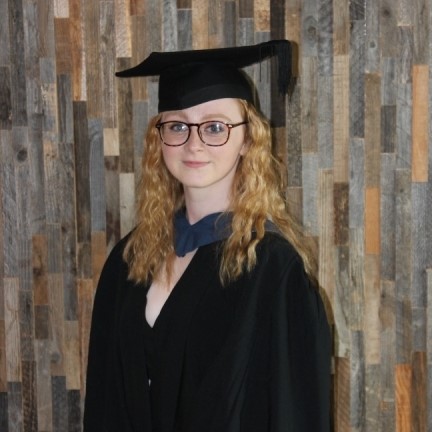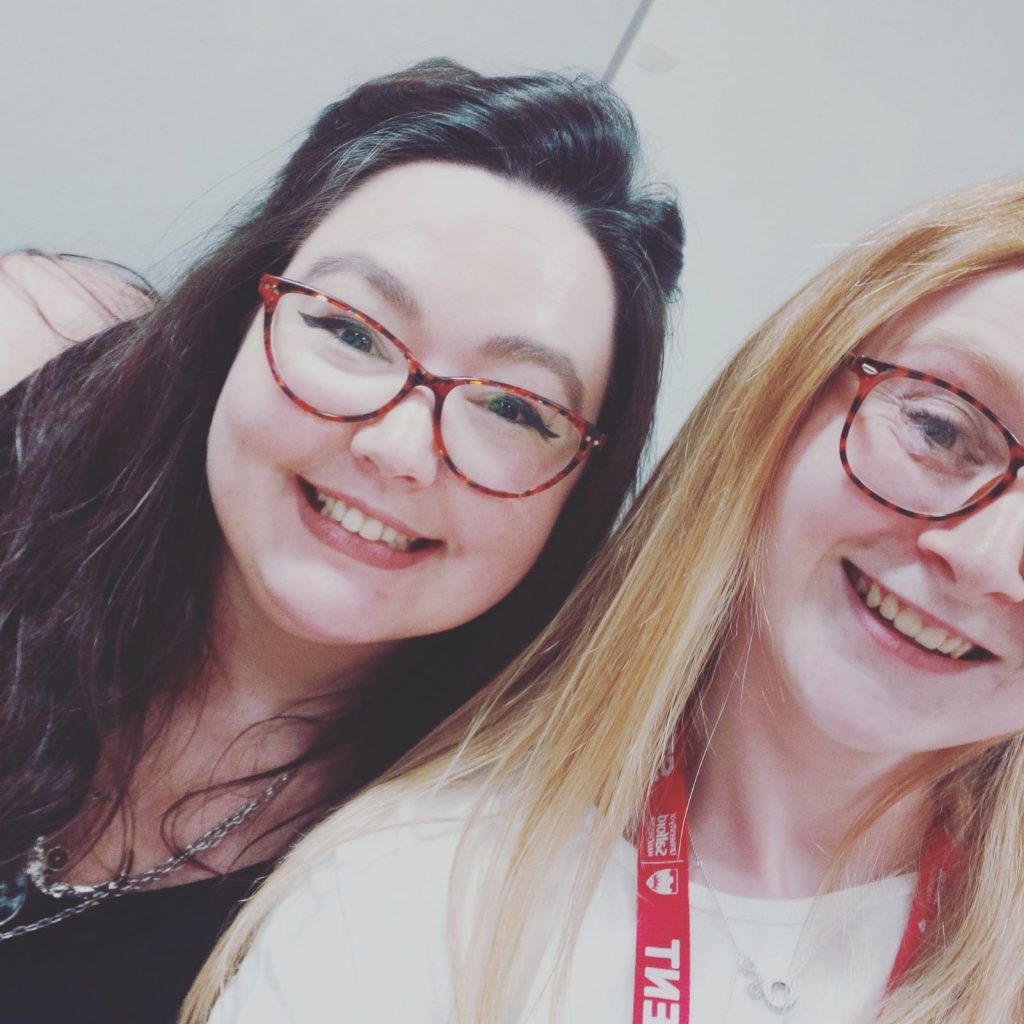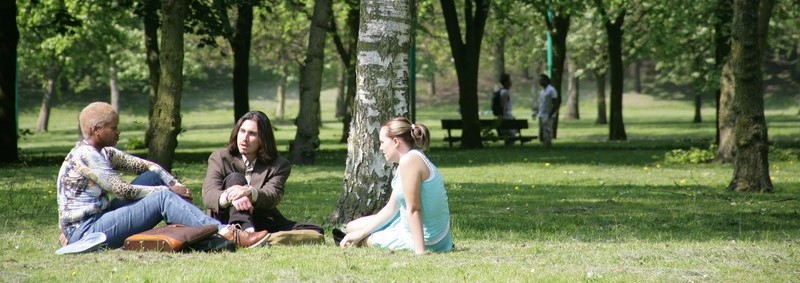My name is Jess Porter and I am a recent graduate from the University of Salford. I studied two English based degrees at Salford: my undergraduate degree in BA English Literature with English Language and my postgraduate degree in MA Literature and Culture.
Now a lot of people ask why I as a native English speaker decided to study both literature and language at undergraduate and my response is always the same – studying literature gives me the chance to explore writing and fiction from across the ages and studying language and linguistics helped me to understand how to use language to write. I chose to undertake a joint honours degree in order to study the art of the English language and to study the art of writing. In combination, my degrees have really strengthened my interest in constructing my own works. I know from studying literature what my favourite genres are and what research topics I am interested in. I also know how to add to the genres I love the most.

Another question I frequently get asked about when I mention my desire to eventually be a published author is why didn’t I study a joint honour course with a focus in creative writing? I made the decision from a young age to write creatively for myself. I didn’t want to be taught how to write in genres or forms that I am not interested in. Instead, I choose a degree where I can learn about key conventions and forms of writing without an expectation of working in forms I am not confident in such as drama and poetry. However, when the option arose to undertake creative based assignments, I would always choose to write something creatively. For example, in the “Children’s Literature” module, I wrote a short story extract aimed at teens and in one of my MA modules, I wrote a non-fiction creative piece regarding feminism and social media.
Finally, I chose to study literature because there’s no better degree to study where you can meet authors. I was lucky enough to meet Katie Lowe, author of The Furies and The Murder of Graham Catton, during my degree and lucky enough to research Joseph Knox, Salford alumnus and author of the Detective Aidan Waits novels and true crime stories for my postgraduate dissertation.

However, I do most of my creative writing on my own for fun. I have been in the slow and steady process of writing a crime thriller crossed with domestic noir novella since I finished my A-Levels in 2016. It’s a work in progress and I am only on chapter three, but it has been steadily shaped by my studies into contemporary writing. If I were to share my initial first chapter from 2016 and compare it to my current draft, I would be shocked at how much of my theoretical grounding had actually influenced my style of writing.
Much of my creative practice is fiction, mostly shaped by the genres I most love to read and watch on television. I have a profile on an online writing site where I share some of my short stories but not my lengthy writing and also a research blog where I write about crime fiction and psychological thrillers.
Happy National Writers Day, Salford. I will be marking my National Writers Day by celebrating on Bookstagram (yes, I am that much of a reading nerd that I have my own bookstagram account), celebrating by reading and sharing some of my favourite writers. How will you be celebrating?
My advice to all budding writers out there, whatever you write, whether it is fiction, non-fiction, or academic research, is to keep writing. There is always someone out there who is happy to read your work. I have found a lot of the time having a friend, fellow student, or colleague reading my work has always helped me to understand why I am writing. If you are finding it hard to keep the writing going or are facing the dreaded WRITER’S BLOCK, my advice to you is to move away from the mode of which you are writing. If you’re typing up your writing, try taking up writing by hand. If you still can’t continue, I always find going back to the drawing board, or the storyboard as it may be. Going back to plan from where your brain is currently hitting the wall helps to refocus the mind and centre in on where you want your writing to go.
Now we come to the more personal side of my writing. I used to struggle to write creatively as my writing was stilted and I found myself constantly overwhelmed and suffering from writer’s block. Now I realise that I can write from the genres I love or writing from experiences. Some of my previously published writing has centred around adoption: The Colours in Me – Writing and Poetry by Adopted Children, Edited by Perlita Harris, and some of my short pieces published online have regarded common issues experienced through growing up. As a result of this, I find writing creatively to be this huge cathartic process. I write best when I am angry or upset. I’ve found some of my short pieces have stemmed from me wanting to express my emotions. Rage writing is one of the ways I find most beneficial as even if I am not writing about myself, I get to explore my rage and anger through my constructed characters and their experiences.
For everyone who reads this, you have one experience under your belt that can shape your writing. We are all currently living through a global pandemic. Now this can do one of two things:
1. You may find that you are sick of lockdown and your creativity is stilted from staring at the same four walls or going for the same boring walks.
2. You need an escape from the boring nature of lockdown so you write to escape it.
I’ve found myself caught in the middle of the two. My academic work and research writing has flowed freely from my fingertips through my keyboard, while my creative work seems to have been on the backburner. However you find yourself, it’s okay. Lockdown and the COVID-19 pandemic can affect us all in different ways. Personally, while I’ve been on furlough from my job, I’ve found myself with more time to read, both fiction and theoretical works and novels for my PhD research.
A common issue among young or aspiring writers is that they focus on trying to produce the next bestseller. Although we would all love to be up there on the Barnes and Noble Bestsellers list, flying around the globe for book signings and being interviewed on Ellen or Oprah, the real aim for any writer is just to write. Write initially for yourself, then if you still want to be published, look for an agent or self-publish. Take it one step at a time. If you overwhelm yourself with the big WHAT IF, you’ll constantly have that fear and pressure in your shoulders.
Saying that, I am also guilty of wanting to be the next big thing in the writing world. Having won the Tony Quale Award for Poetry in 2010-ish (many moons ago), I’d love to have more of my work recognised and to be known as award-winning author . I’d love to be the author of a book (or many) that aspires another young person to start writing. My hope for the future of my writing is to write a book that at least one person finds inspirational or can relate to in the manner that I relate to many books. If just one person reads my books and finds them a form of escapism, as I have found many books, then I will be happy. What I am trying to say is that you don’t need to be published to be a writer and you don’t need to be famous. If you sit down and write words on paper whether by hand or on a screen, YOU ARE A WRITER. Words to live by… I am a writer.





Second Porter PhD on the way. Well done jess from a proud dad